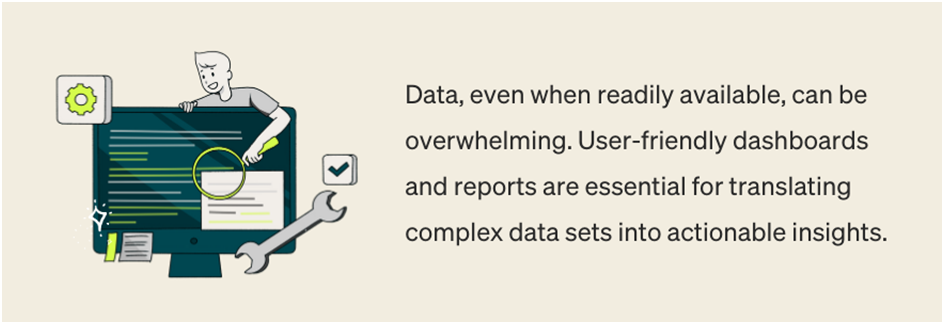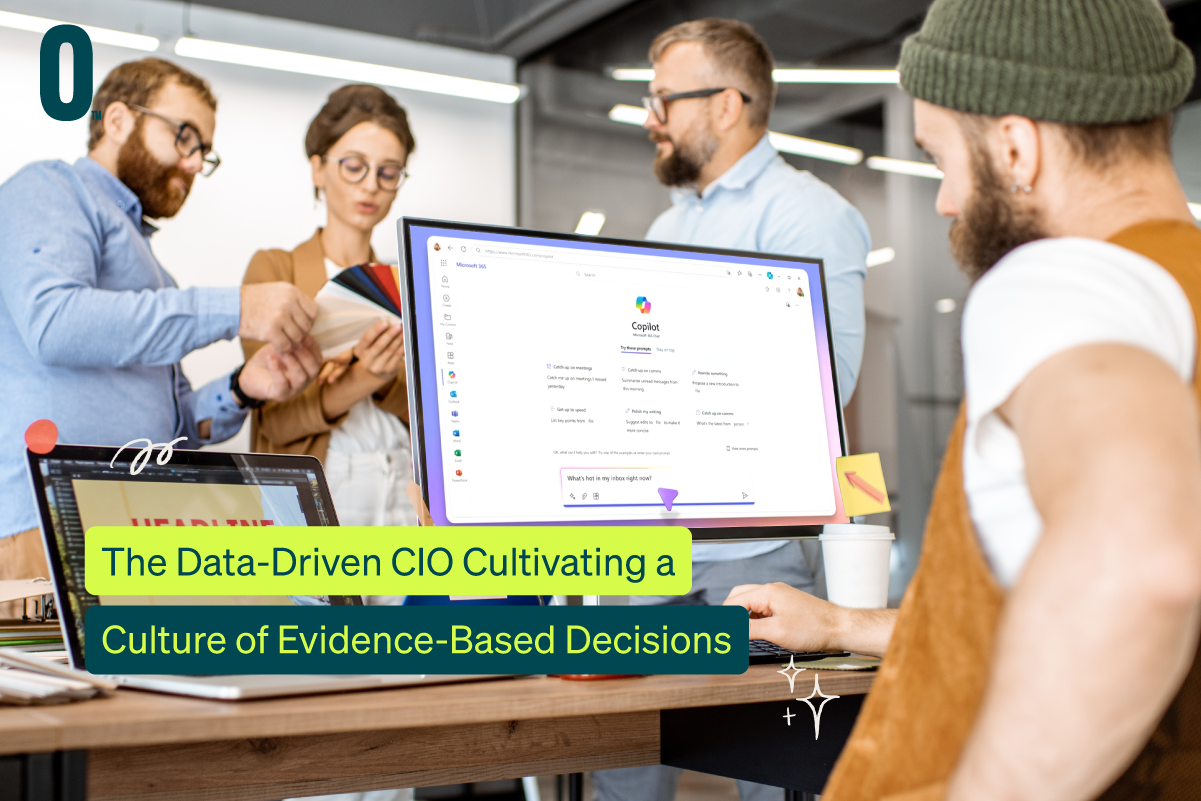In the age of information overload, data is no longer a luxury; it’s the lifeblood of successful organisations. However, simply having access to data isn’t enough. To truly leverage its power, businesses need a culture that embraces data-driven decision-making. This is where the modern CIO, transformed from a tech manager to a strategic leader, plays a crucial role. Here’s some insight from our Melbourne MSP.
Building Data Literacy: Empowering Everyone with Data Skills
The foundation of a data-driven culture is a workforce equipped to understand and utilise data effectively. This goes beyond just data analysts; every employee, from marketing specialists to frontline customer service representatives, can benefit from data literacy. Here’s how CIOs can champion data literacy:
- Invest in Training Programs: Develop or partner with training providers to offer data analysis workshops and courses that cater to different experience levels.
- Promote Online Learning Resources: Curate a collection of online tutorials, e-books, and data visualisation guides that employees can access on-demand to enhance their data skills.
- Embed Data Concepts in Onboarding: Integrate data analysis fundamentals into onboarding programs for new hires, equipping them with the necessary tools from day one.
- Foster Peer Learning: Encourage data-savvy employees to share their knowledge through brown bag lunches or internal knowledge-sharing platforms.

Breaking Down Data Silos: Creating a Unified View
Organisational silos act as barriers to data flow, hindering a holistic understanding of the business. Here’s how CIOs can break down these silos and create a unified data landscape:
- Implement a Centralised Data Management Platform: Invest in a data lake or data warehouse that can securely store and integrate data from disparate sources across departments.
- Standardise Data Collection and Storage: Establish clear guidelines for data collection methods and formats to ensure consistency and facilitate seamless integration.
- Promote Data Sharing and Collaboration: Encourage cross-departmental collaboration on data projects, fostering a sense of collective ownership and responsibility for data quality.
- Develop Data Governance Framework: Implement a data governance framework that outlines data ownership, access controls, and security protocols to ensure responsible data utilisation.
Developing Data-Driven Dashboards and Reporting:
Data, even when readily available, can be overwhelming. User-friendly dashboards and reports are essential for translating complex data sets into actionable insights. When designing these tools, CIOs should consider:
- Target Audience: Tailor the format and content to the specific needs and information consumption preferences of different user groups.
- Visual Clarity: Utilise clear visualisations like charts, graphs, and heatmaps to present data in a visually appealing and easily digestible manner.
- Real-Time Data Insights: Leverage technology to provide dashboards and reports that offer real-time updates, allowing for informed decision-making based on the latest information.
- Actionable Insights: Focus on reports that not only present data but also offer actionable insights and recommendations for improvement.
The Role of AI in Data Analysis: Augmenting Human Expertise
Artificial Intelligence (AI) can be a powerful tool for CIOs looking to unlock the full potential of their data. AI algorithms can automate repetitive tasks such as data cleansing and analysis, freeing up valuable human resources for more complex tasks. Additionally, AI can:
- Identify Hidden Patterns and Trends: Utilise machine learning algorithms to uncover hidden patterns and correlations within data sets that may be missed by human analysts.
- Predict Future Outcomes: Leverage predictive analytics to forecast future trends and potential outcomes, allowing businesses to make data-driven decisions and mitigate risks.
- Enhance Data Security and Compliance: Employ AI-powered tools to detect anomalies and identify potential security breaches, ensuring data integrity and regulatory compliance.

Leading by Example: Championing the Data-Driven Mindset
Ultimately, cultivating a data-driven culture is a top-down initiative. CIOs must champion data-driven decision-making by example and encourage its adoption across all levels. This involves:
- Embedding Data in Strategy Discussions: Integrate data analysis and insights into strategic planning sessions, ensuring data informs key business decisions.
- Celebrating Data-Driven Success Stories: Highlight instances where data-driven decision-making led to positive outcomes, reinforcing the value of evidence-based approaches.
- Providing Incentives for Data Utilisation: Recognise and reward employees who actively utilise data to improve their work performance or identify business opportunities.
- Open Communication and Transparency: Foster a culture of open communication where data is readily shared, and employees feel comfortable questioning assumptions or suggesting data-driven solutions.
The Data-Driven Advantage
Cultivating a data-driven culture is an ongoing journey for any organisation. However, by prioritising data literacy, breaking down silos, and adopting data-driven tools and methodologies, CIOs can empower their organisations to make informed decisions based on evidence, not intuition. This data-driven advantage translates into numerous benefits:
- Improved Operational Efficiency: Data-driven insights can help identify bottlenecks, optimise processes, and streamline operations, leading to increased productivity and cost savings.
- Enhanced Customer Experience: By analysing customer data, businesses can personalise interactions, tailor marketing campaigns, and address customer needs more effectively, leading to higher customer satisfaction and loyalty.
- Data-Driven Innovation: Data can be a powerful fuel for innovation. By analysing historical trends and identifying customer needs through data, businesses can develop new products, services, and business models that cater to specific market demands.
- Risk Mitigation and Proactive Decision-Making: Data analysis can help identify potential risks and predict future market changes. This allows businesses to take proactive steps to mitigate risks and capitalise on emerging opportunities before the competition.
- Improved Communication and Collaboration: Data serves as a common language across departments, fostering open communication and collaborative decision-making based on shared insights.
In today’s dynamic business landscape, data is no longer just an IT concern; it’s a strategic asset. By embracing a data-driven culture, CIOs can transform their organisations into agile, data-informed enterprises that are well-positioned for sustainable growth and success.
Empowering Data-Driven Decisions with Otto IT’s Virtual CIO Services
The journey to a data-driven culture doesn’t have to be navigated alone. Otto IT, Melbourne’s leading Managed Service Provider (MSP), offers comprehensive virtual CIO services to businesses of all sizes and across all industries. Our team of seasoned IT experts acts as an extension of your leadership, providing strategic guidance, data analysis expertise, and the tools to unlock the power of your data.
With Otto IT’s virtual CIO services, you’ll benefit from:
- Expert Strategy & Planning: We’ll collaborate with you to define your data goals, develop a data-driven roadmap, and implement the necessary technology infrastructure.
- Data Literacy Training: Our team empowers your workforce with the skills needed to understand and utilise data effectively.
- Actionable Insights & Reporting: We leverage advanced analytics to extract valuable insights from your data and translate them into actionable reports that inform strategic decision-making.
- Cost-Effective Solution: Eliminate the need for a full-time CIO by leveraging our expertise on a flexible, as-needed basis.
Embrace the power of data-driven decision-making and propel your business forward. Contact Otto IT today and discover how our virtual CIO services can equip your organisation for success in the information age.




